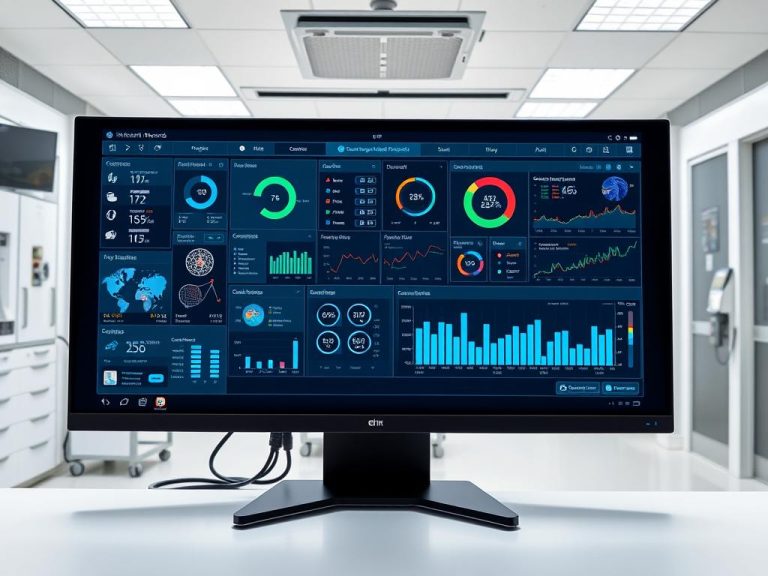Can Less Screen Time Enhance Your Mental Health? Insights and Tips
Studies show reducing screen time can improve mental health, especially for young people. A JAMA Network Open study found less screen time led to fewer behavioural issues. It also enhanced social interactions.
The average person checks their phone 96 times daily. This habit can affect emotional and mental well-being. Too much screen time may cause depression, anxiety, and digital fatigue.
Balancing technology use and mental health is vital in our digital world. Understanding screen time’s impact on our minds is crucial. We can benefit from a more balanced digital lifestyle by limiting our exposure.
Let’s explore insights and tips for mindful screen time reduction. These strategies can help enhance your mental health and overall well-being.
Understanding the Impact of Screen Time on Mental Wellness
Digital devices have become central to our daily lives. In the US, 30% of adolescents report poor mental health. In Europe, 25% of young teens face psychological issues. The pandemic has worsened this trend.
Current Screen Usage Statistics and Trends
High screen exposure can cause sleep disorders and mood swings. Lack of quality sleep can worsen anxiety and depression. It can also impair thinking and reduce stress-handling abilities.
The Link Between Digital Devices and Mental Health
Too much social media can make people feel lonely. They often compare themselves to friends who seem happier. Reducing evening screen use can improve sleep quality and mental health.
Cutting back on screen time can boost focus and productivity. Focusing on one task at a time can lead to greater success.
How Modern Lifestyle Contributes to Excessive Screen Time
Limiting screen time during work hours can reduce stress. Taking breaks from social media helps too. In-person interactions can reduce loneliness and isolation.
Children who spend over two hours daily on screens show higher anxiety levels. During the pandemic, children’s screen time increased to nearly six hours daily.
A study linked screen time to increased depression risk in adults. Excessive screen use can cause anxiety and sleep problems. It can also lead to reduced physical activity and digital eye strain.
Implementing strategies to manage screen time can improve mood and productivity. It can also enhance physical health and emotional stability. Some people have seen benefits from setting strict work email boundaries.
Does Reducing Screen Time Improve Mental Health
Recent studies suggest cutting screen time may boost mental health in youngsters. The SCREENS trial in Denmark found limiting leisure screen time improved children’s well-being. The study involved 89 families over two weeks.
Children who reduced screen use showed fewer emotional and peer-related problems. They also displayed more prosocial behaviour. These findings highlight the benefits of mindful technology use.
| Metric | Intervention Group | Control Group |
|---|---|---|
| Total Difficulties Score | Decreased by 1.67 points more | No significant change |
| Internalizing Symptoms | Decreased by 1.03 points more | No significant change |
| Prosocial Behaviour | Increased by 0.84 points more | No significant change |
Boys and children with higher initial screen time benefited most. The study revealed the potential of screen time reduction benefits and mental health improvement. A digital detox approach proved effective.
“Reducing screen time can positively impact mental health, particularly in children and adolescents.”
The SCREENS trial stresses the need for a healthy digital-offline balance. It’s crucial to understand screen time’s impact on mental health. This knowledge can help nurture well-adjusted individuals in our tech-driven world.
The Science Behind Screen Time and Psychological Well-being
Recent studies reveal a link between screen time and mental health. Excessive screen use correlates with lower psychological well-being. This is particularly true for children and adolescents.
Research Findings from Recent Studies
A University of Missouri study connected Facebook use to depression symptoms. This was especially true when users felt envious.
For adults, a meta-analysis found a link between screen time and depression risk. This risk increased when combining television and smartphone content consumption.
Impact on Children and Adolescents
- Among 14- to 17-year-olds, high users of screens (7+ h/day vs. low users of 1 h/day) were more than twice as likely to ever have been diagnosed with depression.
- High users of screens were also more than twice as likely to ever have been diagnosed with anxiety.
- High users of screens were treated by a mental health professional at a higher rate compared to low users.
- High users of screens were more likely to have taken medication for a psychological or behavioural issue in the last 12 months compared to low users.
Effects on Adult Mental Health
Screen time affects boys and those with higher initial difficulty scores more. Moderate use of screens (4 h/day) was associated with lower psychological well-being, while non-users and low users of screens generally did not differ in well-being.
| Metric | Value |
|---|---|
| 63k accesses to the study | on the association between screen time and adolescent mental health |
| 40 citations received by the study | indicating a significant level of interest and engagement within the academic community |
| 176 Altmetric score | reflecting the attention the study received across various platforms and channels |
The American Academy of Paediatrics suggests children limit screen time to less than 2 hours daily. Many adolescents exceed this recommendation.
Teens spend about 6 to 9 hours a day on media-related screen activities. This excludes schoolwork and housework.
According to the World Health Organization, an estimated 14% of young people between 10 and 19 years old globally experience mental health problems, with depression, anxiety, and behavioural disorders being common issues.
The study explores how screens affect adolescent mental health. It covers life satisfaction, self-efficacy, and behavioural aspects.
More research is needed on screen content and device interaction. This will help us better understand the link between screen time and teen mental health.
Signs of Unhealthy Screen Time Habits
Excessive screen time has become a major concern in our digital world. Many people struggle to balance technology use with mental wellbeing. Signs of unhealthy habits include craving social media validation and addiction to instant gratification.
Digital fatigue can cause difficulty concentrating and trouble sleeping. It may also lead to low energy and feelings of anxiety. These symptoms can significantly impact daily life and overall wellbeing.
Prolonged device use is linked to various physical and cognitive issues. Reduced physical activity can result in digital eye strain and headaches. Blurred vision and neck pain are also common consequences.
Excessive screen time affects language development and executive functioning. It can also harm academic performance in children and teens. Recognising these signs is crucial for maintaining mental health.
- Needing positive feedback from social media to feel good
- Addiction to instant gratification
- Experiencing digital fatigue, including difficulty concentrating, trouble sleeping, low energy, and feelings of anxiety
- Reduced physical activity, leading to digital eye strain, headaches, blurred vision, and neck pain
- Negative impacts on language development, executive functioning, and academic performance
“Spending time with educational content present can help children at around 17 months with vocabulary development.”
Digital addiction poses significant challenges to our wellbeing. However, by spotting warning signs early, we can take action. This allows us to regain control and prioritise mental health in the digital age.

Practical Strategies for Reducing Daily Screen Exposure
Managing screen time is vital for mental well-being in our digital world. Here are practical strategies to cut down daily screen exposure. These methods can help you achieve a more balanced lifestyle.
Setting Digital Boundaries
Establish clear digital boundaries by setting time limits for screen-based activities. Many smartphones offer built-in screen time management tools. These allow you to set daily or weekly limits on app usage.
You can also receive reminders when you’ve reached your quota. This helps you stay on track with your screen time goals.
Implementing Screen-Free Time Blocks
Set aside regular “screen-free” time blocks throughout your day. This means choosing specific hours or evenings to avoid using digital devices. Instead, use this time to engage in alternative activities.
During these periods, focus on hobbies or spend quality time with loved ones. You can also use this time to unwind and recharge.
Alternative Activities for Screen-Free Time
- Engage in physical exercise, such as taking a walk, doing yoga, or participating in a sport.
- Immerse yourself in a good book or pick up a creative hobby like painting, writing, or crafting.
- Spend time in nature, whether it’s a stroll through a park, a hike in the countryside, or simply sitting and observing the outdoors.
- Nurture social connections by scheduling face-to-face interactions with friends and family, or engaging in group activities.
- Practice mindfulness and relaxation techniques, such as meditation, deep breathing, or journaling.
Try these screen time reduction techniques to improve your mental health. Set digital boundaries and explore screen-free activities. This approach can help you create a more balanced digital lifestyle.
Benefits of Limited Screen Time on Mental Health
Cutting back on digital device use can boost your mental well-being. It can lead to less overwhelming stimulation and more stable emotions. You may also experience reduced anxiety and better sleep patterns.
Limiting screen exposure can sharpen your focus and create more time for physical activity. These changes contribute to improved mental health. People who set digital boundaries report less stress and more quality family time.
By reducing screen time, you can enjoy better mental health and enhanced digital wellbeing. This change can lead to increased sleep and energy levels.
- Decreased overwhelming stimulation and more stable emotional states
- Reduced anxiety and improved sleep patterns
- Better focus and increased time for physical activity
- Significant reductions in stress and improved quality time with loved ones
- Increased sleep and energy levels for better overall health
Embracing screen time reduction benefits can transform your mental health and quality of life. Finding a balanced approach to digital usage fosters a healthier, more fulfilling lifestyle.
“Limiting my screen time has been a game-changer for my mental health. I feel more present, focused, and energised throughout the day.”
Creating a Balanced Digital Lifestyle
Striking a healthy balance between online and offline lives is crucial for mental wellbeing. Mindful technology usage and sustainable digital habits support our personal, professional, and family goals. Let’s explore how to achieve this balance.
Mindful Technology Usage Tips
Being intentional about our digital activities is key to mindful technology use. Set boundaries for work emails and minimise screen exposure before bedtime. Take short breaks during screen time for stretching or mindfulness exercises.
Regularly decluttering digital apps and files can also help reduce mental clutter. These practices can significantly reduce eye strain and mental fatigue.
Building Healthy Digital Habits
Establishing healthy digital habits is vital for maintaining a balanced lifestyle. Designate tech-free zones like dining tables or bedrooms. Set specific periods for screen use and intentionally disconnect through digital detoxes.
Prioritise real-world connections alongside digital ones. This approach fosters genuine relationships and enhances our overall sense of well-being.
Family-Based Approaches to Screen Time Management
For families, implementing screen time limits and having alternative activities ready can be effective. Schools and parents should collaborate to teach digital wellness skills to children and adolescents.
Parents can role-model healthy technology habits. This helps instil a balanced approach to screen time and promotes face-to-face interactions within the family.
Use technology intentionally to support personal, professional, and community goals. This approach maintains mental health and well-being. Enjoy technology’s benefits while safeguarding your psychological and emotional health.
“Disconnecting from screens periodically can significantly contribute to improved mental clarity and reduced stress.”
Conclusion
Cutting down screen time can boost mental wellness, especially for young people. While avoiding devices entirely isn’t feasible, balanced tech use can improve well-being. It leads to better sleep, less anxiety, and more meaningful social connections.
The goal is to find a healthy balance between technology and mental health. Setting digital boundaries and engaging in offline activities can help. This approach fosters a balanced digital lifestyle that supports mental health improvement.
Our world relies heavily on digital devices. Therefore, a mindful approach to screen time is vital. It safeguards our psychological well-being. By managing our screen use, we can enjoy tech benefits whilst protecting our mental health.
Taking steps to control screen time unlocks technology’s potential. It also preserves the mental vitality essential for a fulfilling life. This balance promotes digital wellness in our increasingly connected world.
FAQ
What are the key statistics and trends related to screen usage?
Screen usage has soared worldwide, becoming a crucial part of daily life. In the US, almost 30% of teens report poor mental health. European figures show 25% of young teens face psychological issues. The pandemic has worsened screen time, with some children using devices for six hours daily.
How does screen time impact mental health and wellbeing?
Studies link excessive screen time to lower psychological well-being in young people. It can lead to depression, anxiety, and digital fatigue symptoms. Research in Frontiers in Psychology found a connection between screen time and increased depression risk.
What are the signs of unhealthy screen time habits?
Unhealthy screen habits include craving social media approval and instant gratification addiction. Digital fatigue symptoms can involve concentration problems, sleep issues, low energy, and anxiety.
How can reducing screen time improve mental health?
Cutting screen time can boost mood, productivity, and physical health. It can reduce overwhelming stimulation and anxiety, while improving sleep and focus. People who set digital boundaries report less stress and more family time.
What are some effective strategies for managing screen time?
Effective strategies include scheduling screen breaks and setting time limits for device use. For young people, allow limited time for shows or social media scrolling. Teach social media literacy to understand that online content often presents an incomplete reality.
How can families and workplaces create a balanced digital lifestyle?
Prioritise face-to-face interactions and minimise screen use before bedtime. Regularly declutter digital apps and files. Families can set screen time limits and prepare alternative activities. Workplaces can set email boundaries to reduce stress and improve work-life balance.














